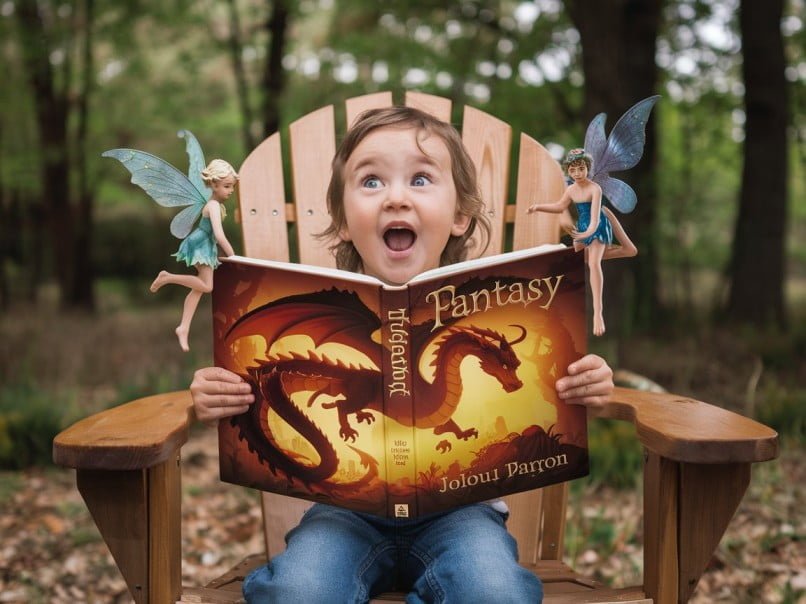Reading is a fundamental skill that opens doors to endless possibilities, and when it comes to children, few genres capture their imagination quite like fantasy. The world of dragons, wizards, and magical realms not only entertains but also plays a crucial role in developing young minds. In this comprehensive guide, we’ll explore the benefits of reading fantasy for children, how to choose age-appropriate books, and strategies to encourage a love for this enchanting genre.
Content Table
Why Reading Fantasy is Important for Children
Sparking Imagination and Creativity
When children immerse themselves in fantasy worlds through reading, their imagination soars. These magical realms encourage creative thinking, allowing young readers to envision possibilities beyond their everyday experiences. This imaginative exercise is not just fun—it’s a crucial part of cognitive development.
Developing Empathy and Emotional Intelligence
Fantasy stories often feature diverse characters facing complex challenges. As children read about these characters’ journeys, they learn to empathize with different perspectives and understand complex emotions. This emotional literacy is a valuable life skill that reading fantasy can help nurture.
Enhancing Vocabulary and Language Skills
Fantasy books often introduce unique words and phrases, engagingly expanding a child’s vocabulary. The rich, descriptive language used in many fantasy novels helps improve reading comprehension and writing skills.
Encouraging Problem-Solving Skills
Many fantasy plots involve characters solving intricate puzzles or overcoming seemingly impossible obstacles. As children read these stories, they indirectly practice problem-solving skills, learning to think creatively and logically.
Providing a Safe Space to Explore Complex Themes
Fantasy often tackles serious themes like good vs. evil, loss, or personal growth in a way that’s accessible to young readers. This allows children to explore and process complex ideas in a safe, fictional context.

Choosing Age-Appropriate Fantasy Books for Children
Early Readers (Ages 5-8)
For children just starting their reading journey, look for fantasy books with:
- Short chapters and simple plots
- Colorful illustrations
- Relatable characters and situations with a touch of magic
Recommended titles:
- “The Magic Tree House” series by Mary Pope Osborne
- “Dragon Masters” series by Tracey West
- “Unicorn Academy” series by Julie Sykes
Middle-Grade Readers (Ages 9-12)
As reading skills develop, children can tackle more complex fantasy stories:
- Longer books with intricate plots
- Fewer illustrations, allowing for more imaginative interpretation
- More developed characters and world-building
Recommended titles:
- “Harry Potter” series by J.K. Rowling
- “Percy Jackson and the Olympians” series by Rick Riordan
- “The Land of Stories” series by Chris Colfer
Young Adult Readers (Ages 13+)
Older children and teens can handle more sophisticated themes and longer books:
- Complex world-building and magic systems
- Multi-layered characters and relationships
- Exploration of deeper themes and moral dilemmas
Recommended titles:
- “The Hobbit” by J.R.R. Tolkien
- “Eragon” by Christopher Paolini
- “Throne of Glass” series by Sarah J. Maas
Strategies to Encourage Reading Fantasy
Create a Magical Reading Nook
Transform a corner of your home into a cozy reading space inspired by fantasy themes. Add twinkling lights, comfortable pillows, and fantasy-themed decorations to make reading time feel special and magical.
Read Aloud Together
Even as children grow older, reading aloud can be a bonding experience. Choose a fantasy novel to read as a family, taking turns to bring the characters to life with different voices. This shared reading experience can spark discussions and deepen understanding of the story.
Explore Fantasy Through Different Media
Complement reading with other fantasy-themed activities:
- Watch film adaptations of fantasy books and compare them to the written versions
- Play fantasy-themed board games or role-playing games
- Encourage creative writing or art projects inspired by favorite fantasy stories

Join or Start a Kids’ Fantasy Book Club
Reading becomes more engaging when shared with peers. Help your child start or join a fantasy book club where they can discuss their favorite stories, characters, and magical worlds with friends.
Use Technology to Enhance the Reading Experience
Leverage e-readers and audiobooks to make fantasy stories more accessible. Many e-books come with built-in dictionaries, making it easier for children to look up new words as they read.
Addressing Common Concerns About Children Reading Fantasy
“Fantasy is just escapism”
While fantasy does offer an escape, it’s much more than that. It teaches valuable lessons about courage, friendship, and perseverance in engaging ways that resonate with young readers.
“Fantasy is too scary for young children”
Choose age-appropriate books and discuss any scary elements with your child. Many children find that conquering fears in a safe, fictional context is empowering.
“Fantasy doesn’t prepare children for the real world”
On the contrary, fantasy often deals with real-world issues in metaphorical ways, allowing children to process complex ideas at their own pace.
The Long-Term Benefits of Reading Fantasy in Childhood
Fostering a Lifelong Love of Reading
Many adults who are avid readers trace their passion back to childhood experiences with fantasy books. The excitement and wonder of these stories can ignite a love for reading that lasts a lifetime.
Developing Critical Thinking Skills
As children engage with complex fantasy worlds and magic systems, they learn to think critically about rules, consequences, and the nature of reality itself. These skills transfer to real-world problem-solving and analysis.
Nurturing Creativity in Various Aspects of Life
The imaginative thinking encouraged by fantasy reading can translate into creative problem-solving in school, work, and personal life. Many innovators and creators credit their success to the imaginative worlds they explored through reading as children.
Building Resilience and Coping Skills
Fantasy often features characters overcoming great adversity. Reading these stories can help children develop resilience and coping strategies for facing their challenges.

Conclusion: The Enduring Magic of Reading Fantasy
Reading fantasy offers children more than just entertainment—it provides a gateway to improved literacy, enhanced creativity, and important life skills. By encouraging your child to explore magical realms through reading, you’re not just helping them become better readers; you’re nurturing their imagination, empathy, and ability to face life’s challenges with courage and creativity.
As parents, educators, and caregivers, we have the wonderful opportunity to introduce children to the enchanting world of fantasy literature. Whether it’s through bedtime stories, family reading sessions, or encouraging independent reading, the time invested in exploring these magical narratives is invaluable.
Remember, every child’s reading journey is unique. Some may dive headfirst into epic fantasies, while others might prefer gentler tales with just a touch of magic. The key is to keep the experience positive, engaging, and tailored to each child’s interests and reading level.
By fostering a love for reading fantasy, we’re not just helping children escape into other worlds—we’re equipping them with the tools to better understand and navigate our own. So, open a book, turn the page, and let the magic of reading fantasy transport you and the children in your life to realms where anything is possible.






One thought on “The Magic of Reading Fantasy for Children”